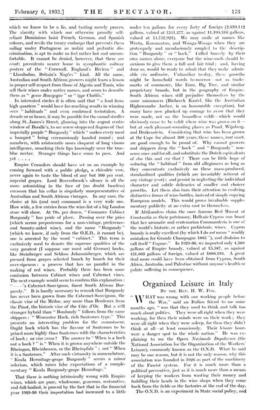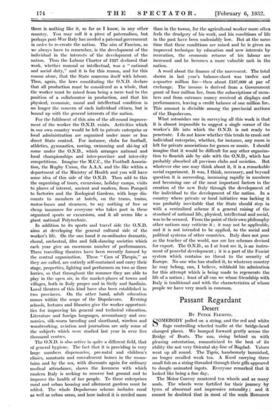Organized Leisure in Italy
BY THE REV. H. W. Fox.
" WHAT was wrong with our working people before the War," said an Italian friend to time some months ago, " was that they used to think and talk too much about politics. They were all right when they were working, for then their minds were on their work ; they were all right when they were asleep, for then they didn't think at all—at least consciously. Their leisure hours were a danger spot to the whole nation." He was ex- plaining to me the Opera Nazionale Dopolaroro (the National Association for the Organization of the Workers' Leisure), commonly known as the O.N.D. What Inc said may be one reason, but it is not the only reason, why this association was founded in 1926 as part of the machinery of the Fascist system. For it is much more than a political preventive, just as it is much more (lain a means of keeping the workers from wasting their money and fuddling their heads in the wine shops when they come back from the fields or the factories at the end of the day.
The 0.N.1). is an experiment in State social policy, and
there is nothing like it, so far as I know, in any other country. You may call it a piece of paternalism, but perhaps post-War Italy has needed a paternal government in order to re-create the nation. The aim of Fascism, as we always have to remember, is the development of the individual in the interests of the development of the nation. Thus the Labour Charter of 1927 declared that work, whether manual or intellectual, was a "national and social duty," and it is for this reason, and for this reason alone, that the State concerns itself with labour. Thus, again, the laws constituting the O.N.D. declare that all production must be considered as a whole, that the worker must be raised from being a mere tool to the position of a collaborator in production, and that his physical, economic, moral and intellectual condition is no longer the concern of each individual citizen, but is bound up with the general interests of the nation.
For the fulfilment of this aim of the all-round improve- ment of the worker the O.N.D. exists. Activities which in our own country would be left to private enterprise or local administration are organized under more or less direct State control. For instance, clubs for football, athletics, gymnastics, rowing, swimming and ski-ing all come under the O.N.O., which arranges national and local championships and inter-province and inter-city competitions. Imagine the M.C.C., the Football Associa- tion, the Rugby Union, the A.A.A. and the like within a department of the Ministry of Health and you will have some idea of this side of the O.N.D. Then add to this the organizing of tours, excursions, holiday camps, visits to places of interest, ancient and modern, from Pompeii to factories and the Zoological Gardens, with large dis- counts to members at hotels, on the trams, trains, motor-buses and steamers, to say nothing of free or cheap insurance for everyone who takes part in these organized sports or excursions, and it all seems like a giant national Polytechnic.
In addition to its sports and travel side the O.N.D. aims at developing the general cultural side of the worker's life. On the one hand it co-ordinates dramatic, choral, orchestral, film and folk-dancing societies which each year give an enormous number of performances. Three travelling theatres have been recently formed by the central organization. These "Cars of Thespis," as they are called, are entirely self-contained and carry their stage, properties, lighting and performers on two or three lorries, so that throughout the summer they are able to play in the open air, in the market-places of towns and villages, both in Italy proper and in Sicily and Sardinia. Local theatres of this kind have also been established in two provinces. On the other hand, adult education comes within the scope of the Dopolavoro. Evening schools, lectures and libraries give the worker opportuni- ties for improving his general and technical education. Literature and foreign languages, accountancy and eco- nomics, silk-worm breeding and shorthand, wireless and woodworking, aviation and journalism are only some of the subjects which were studied last year in over five thousand centres.
The O.N.D. is also active in quite a different field, that of general hygiene. The fact that it is providing in very large numbers dispensaries, pre-natal and children's clinics, sanatoria and convalescent homes in the moun- tains and by the sea, with discounts again for ordinary medical attendance, shows the keenness with which modern Italy is seeking to recover lost ground and to improve the health of her people. To these enterprises rural and urban housing and allotment gardens must be added. The whole Dopolavoro scheme includes rural as well as urban areas, and here indeed it is needed more than in the towns, for the agricultural worker more often feels the drudgery of his work, and his conditions of life in the past have been undeniably low. But at the same time that these conditions are raised and he is given an improved technique by education and new interests by recreation, the economic returns of his labour are increased and he becomes a more valuable unit. in the nation.
A word about the finance of the movement. The total shown in last year's balance-sheet was twelve and a-quarter million lire—then about £137,000 at par of exchange. The income is derived from a Government grant of four million lire, from the subscriptions of mem- bers and from entrance money received at displays and performances, leaving a credit balance of one million lire. This amount is divisible among the provincial sections of the Dopolavoro.
What astonishes one in surveying all this work is that it is almost impossible to suggest a single corner of the worker's life into which the O.N.D. is not ready to penetrate. I do not know whether this tends to crush out individual enterprise, whether, for instance, any room is- left for private associations for games or music. I should imagine that it would be difficult for any other organiza- tion to flourish side by side with the 0.N.D., which has probably absorbed all previous clubs and societies. But whatever else one may think about it, it is a remarkable social experiment. It was, I think, necessary, and beyond question it is succeeding, increasing rapidly in numbers and becoming one of the most important factors in the creation of the new Italy through the development of the individual to the development of the nation. In a country where private or local initiative was lacking it was probably inevitable that the State should step ia with a centralized scheme if a general raising of the standard of national life, physical, intellectual and social, was to be secured. From the point of their own philosophy other nations may criticize it ; it may not be applicable, and it is not intended to be applied, to the social and political systems of other countries. Italy does not pose as the teacher of the world, nor are her schemes devised for export. The 0.N.D., as I at least see it, is an instru- ment of peaceful development ; it is a part of the Fascist system which contains no threat to the security of Europe. No one who has studied it, to whatever country he may belong, can, I believe, withhold his admiration for this attempt which is being made to regenerate the life of a nation ; least of all can we whose friendship with Italy is traditional and with the characteristics of whose people we have very much in common.









































 Previous page
Previous page